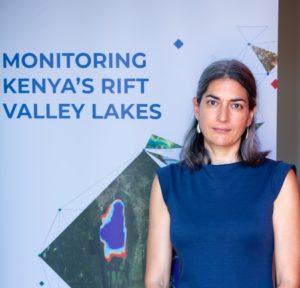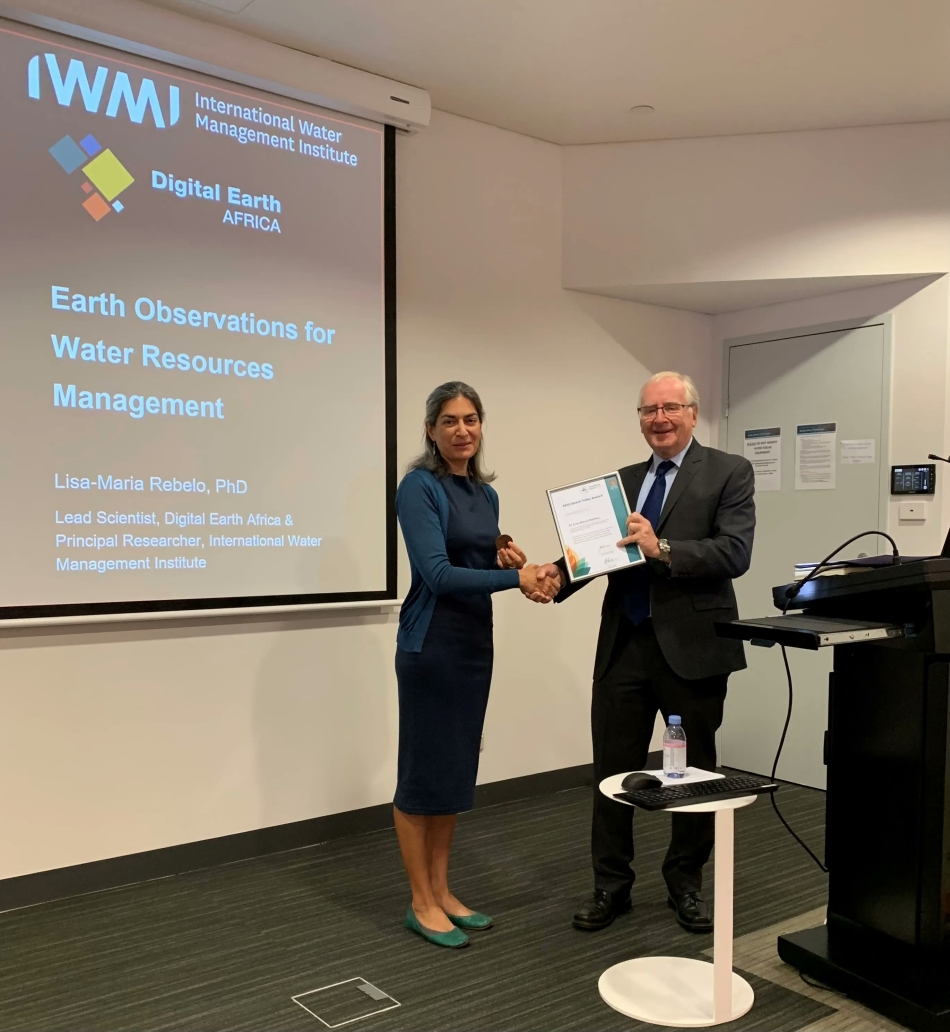Interviewed by Victoria Blymier, Princeton in Asia Fellow, IWMI
 Raised in Nairobi, Kenya, Dr. Lisa-Maria Rebelo’s passion to improve natural resource management in East Africa led to her 20-year career as a remote sensing research specialist with IWMI. Today, Dr. Rebelo provides her expertise to Digital Earth Africa, where she develops Earth observation tools that are revolutionizing our understanding of the water cycle to strengthen development across the entire African continent. She was recently awarded the prestigious Derek Tribe Award for her scientific contributions and is recognized as a lead in her field. This International Day of Women and Girls in Science, we celebrate Dr. Rebelo’s achievements and inquire of her advice for the next generation of aspiring female researchers.
Raised in Nairobi, Kenya, Dr. Lisa-Maria Rebelo’s passion to improve natural resource management in East Africa led to her 20-year career as a remote sensing research specialist with IWMI. Today, Dr. Rebelo provides her expertise to Digital Earth Africa, where she develops Earth observation tools that are revolutionizing our understanding of the water cycle to strengthen development across the entire African continent. She was recently awarded the prestigious Derek Tribe Award for her scientific contributions and is recognized as a lead in her field. This International Day of Women and Girls in Science, we celebrate Dr. Rebelo’s achievements and inquire of her advice for the next generation of aspiring female researchers.
Take us back to the beginning: why did you choose to pursue a career in water science and how did that lead to your work today?
I didn’t choose a career in water science—it chose me. Growing up, I was always fascinated with problem solving, photography, and understanding the world around me. When I became aware of satellite remote sensing at the age of 17 and started learning about Earth observation, it became my passion because it brought my interests together. Once I finished my PhD in remote sensing, my friend showed me an ad for a post-doctoral position at IWMI exploring the use of remote sensing for wetlands, ecosystems which are at the interface of land and water. That’s how I started my career at IWMI—I entered from the remote sensing angle, using this technology as a tool to better understand water resources.
How does remote sensing facilitate natural resource management in Africa and Asia?
Many of the river basins where IWMI works across Africa and Asia are data scarce. There is limited information available from ground monitoring; for example, we do not have comprehensive data about how much water is flowing in rivers or being received from rainfall, and how much is stored in the soil. As a result, many management decisions are made without a full understanding of the wider basin resource.
But with the availability of data from increasingly sophisticated satellite sensors, we can fill these information gaps. Over the past decade, data from satellites have revolutionized how we understand the water cycle and its elements across scales, enabling more informed decision making around water availability, water use, and importantly, how much water is available for further use within sustainable limits.
What is the importance of mentoring young women in STEM fields? Do you see yourself as a role model for young female researchers?
I’ve been extremely lucky throughout my career to have excellent mentors—both male and female—who’ve helped me identify my niche and achieve my goals. I think it’s important that we have more female mentors for young researchers because it helps to normalize women in lead roles. To encourage young women to not only pursue science careers but also to become leaders and innovators, we need more women visible in leadership positions.
I would like to see myself as a role model for how women can pursue careers in STEM-related subjects and be successful while also balancing family life. It is possible to balance leadership, family, and wellbeing—women should not have to compromise achieving these.
What professional accomplishment are you most proud of and why?
My biggest professional accomplishment is being seen as a leader in the use of remote sensing technology and receiving that recognition through my position with Digital Earth Africa and the Derek Tribe Award. This award was a culminating point in my research career; it enabled me to put a spotlight on how we have revolutionized natural resource management by combining our work on Earth observation-based applications, with Open Data Cube technology at Digital Earth Africa, and my past research with IWMI. It was a very exciting moment.

How did growing up in the Global South influence your career trajectory?
I’m a second-generation Kenyan born and raised in Nairobi. My identity has guided my career path, and my background enabled me to see the potential for new advanced satellite research to improve natural resource management across the whole continent. Typically, many African countries are data scarce, there’s a major challenge to manage the large expanses of water resource and wetlands. So much can be done to strengthen management and inform decision making through Earth observation data. Understanding the needs and seeing the potential of technology to address these has framed my interests and career direction.
According to UNESCO, approximately 33% of all researchers are women. Why do you think fewer women than men pursue STEM careers?
I think that it’s a challenge of optics. When you see mostly men in certain fields, it can form a bias that STEM careers aren’t suitable for women. This is something that needs to change through visibility, information sharing, and mentorship. Once this happens, women will serve as role models for the next generation. By normalizing women in STEM, we can encourage more young women to pursue STEM careers.
Which word(s) from 2023’s theme, “Innovate. Demonstrate. Elevate. Advance. Sustain. (IDEAS),” most resonates with your research on sustainable and equitable development at IWMI?”
They’re all hugely relevant. My colleagues and I use innovative approaches through Earth observation to develop thematic products, workflows and analytics — whether for water security, food security, or other aspects — in order to demonstrate, and by doing so, to elevate the use of digital technologies to address natural resource management challenges. This advances how resources are managed and how decisions are made surrounding their use, with the goal of ensuring that their use is sustainable.
What advice would you like to give to aspiring female researchers?
I would again like to highlight the importance of finding a mentor whom you respect and approaching them to ask for support and guidance. Don’t underestimate the power of having a good mentor.
Secondly, I would like to highlight within the context of STEM careers, Earth observation is a rapidly evolving and very exciting field. We have new satellites launched on a regular basis, pushing forward the boundaries of science and how we understand the Earth’s systems. It’s also changing from a historically male-dominated field, to one that is now much more diverse. I would encourage anyone who’s interested to reach out, and to pursue a career in Earth observation.

